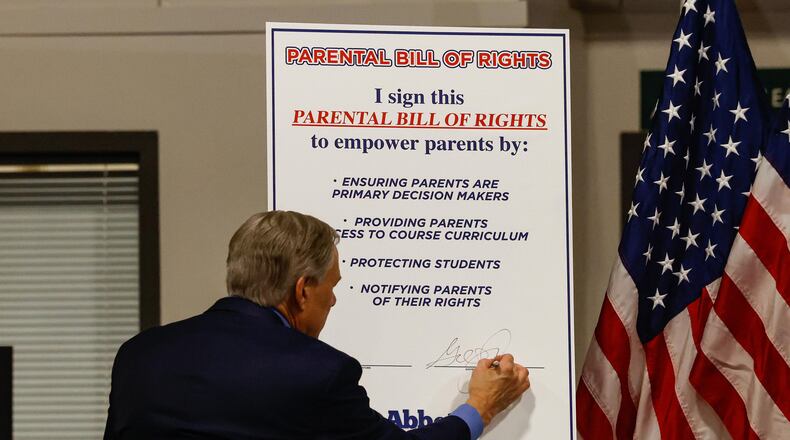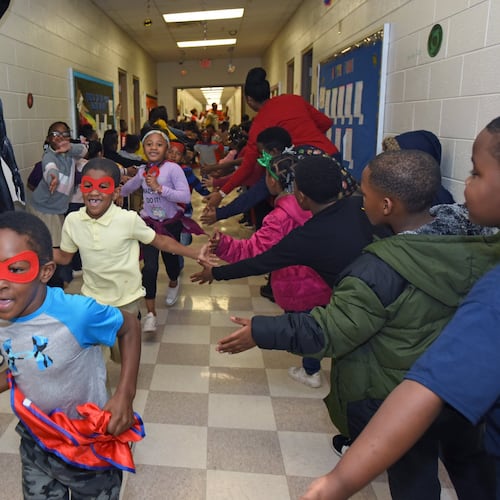Some of the worst education policy in Georgia has been enacted under the defense that it empowers parents. Whether making it easier to ban books or censure a teacher’s discussion of race in America, the General Assembly’s rallying cry has become, “Trust parents.”
I’m a parent. Please don’t put that much trust in me.
Because I am not an objective or disinterested party. I’ve had four children in the Georgia public school system. Their experiences created the lens through which I assessed classes, teachers and programs at my local schools.
It was not a wide-angle view.
Parents can be trusted in one respect — to look out for what’s best for their children. They’re laser-focused on that goal. But can they be expected to know what’s best for other kids? For your kids or mine?
Probably not. Most aren’t paying that much attention to the needs of other students. Typically, parents speak up at school board meetings or legislative hearings to address an issue around their own child’s experience.
Most of the parents who reach out to me share a specific gripe, with a teacher or a policy that they feel is not serving their student well. For example, this is the time of year when I hear from parents unhappy to discover there’s no wiggle room in Georgia’s rule that children turn 5 by Sept. 1 to enroll in kindergarten. Their almost 5-year-old is ready, the parents explain. They say there ought to be an exemption that enables a child whose birthday is a day, a week or a month after the cutoff to be considered.
They are not swayed when I point out the parents of a child turning 5 in October or November might contend there should be a kindergarten appeals process for them as well. Nor do parents necessarily sympathize with the argument made by the districts that injecting so much elasticity into when children begin school renders the policy meaningless.
Parents can’t empathize with the district perspective because they’re fixated on their precocious nearly 5-year-old who is now relegated to another year of preschool. (And they’re stuck with another year of tuition bills.)
That’s why we need teachers, administrators and school boards who realize that a private benefit has to be balanced against the public good.
Both biology and society lead parents to prioritize their own child’s needs, which can skew their responses. Over the years, parents have complained to me that teachers don’t keep a stock of pencils for their child who always forgets to bring one. Or the teacher fails to ensure their kids eat their entire lunch every day. The teacher keeps the classroom too hot or too cold for their child. The child finds the teacher’s accent distracting. (In one case, the teacher was from New York.) Their child has a lot going on — soccer tryouts, cheer practice, dance recital — so shouldn’t be penalized for turning in late assignments. There are too many projects in the class. Or too few.
Years ago, education advocates began to tout differentiated instruction, which broadly defined means tailoring instruction to meet the individual needs of each child. A researcher once compared it to preparing a meal that accommodates the vegetarian, the meat eater and the gluten intolerant.
I understood that analogy because it was my household situation. Many of our fraught attempts to pick a restaurant for a family meal ended with nobody talking and everyone getting their own takeout. So I get why the research finds individualized instruction doesn’t always meld with the realities of a classroom of 30 students.
The differences among my children extended to their school activities. My older son joined mock trial and the literary magazine. My younger son was the only child to play a varsity sport. That earned me a chaperone seat on a six-hour ride to a South Georgia tournament in 90-degree weather in an unair-conditioned school bus. The interests of my youngest daughter initiated me into the previously unknown universe of musicals, vocal performances and three-day trips to All State Chorus in Athens.
The ideal school setting would have been dramatically different for each of my children based on their temperaments, interests and inclinations. Which is why we ought to defer to professionals rather than parents in designing curriculum, enrichment programs and reading lists.
If you ever watch parents file into a school gym or auditorium for a class performance, they don’t settle into their seats until they spot their child on the stage. Teachers have to keep their eyes on all the students.
About the Author
Keep Reading
The Latest
Featured



